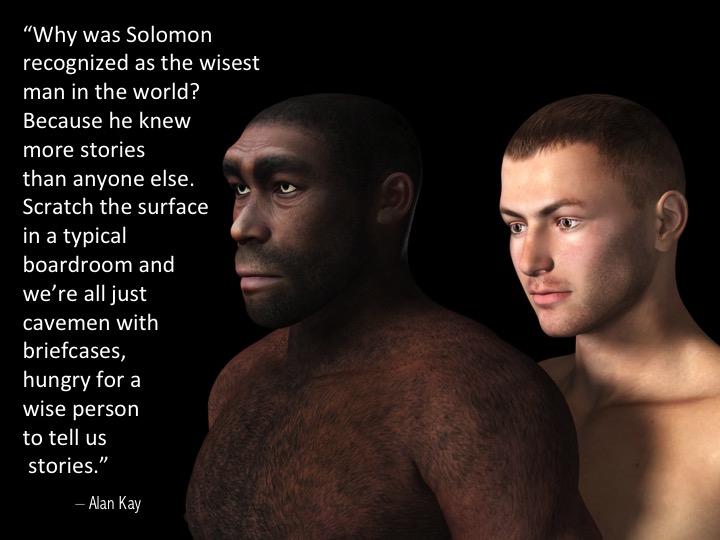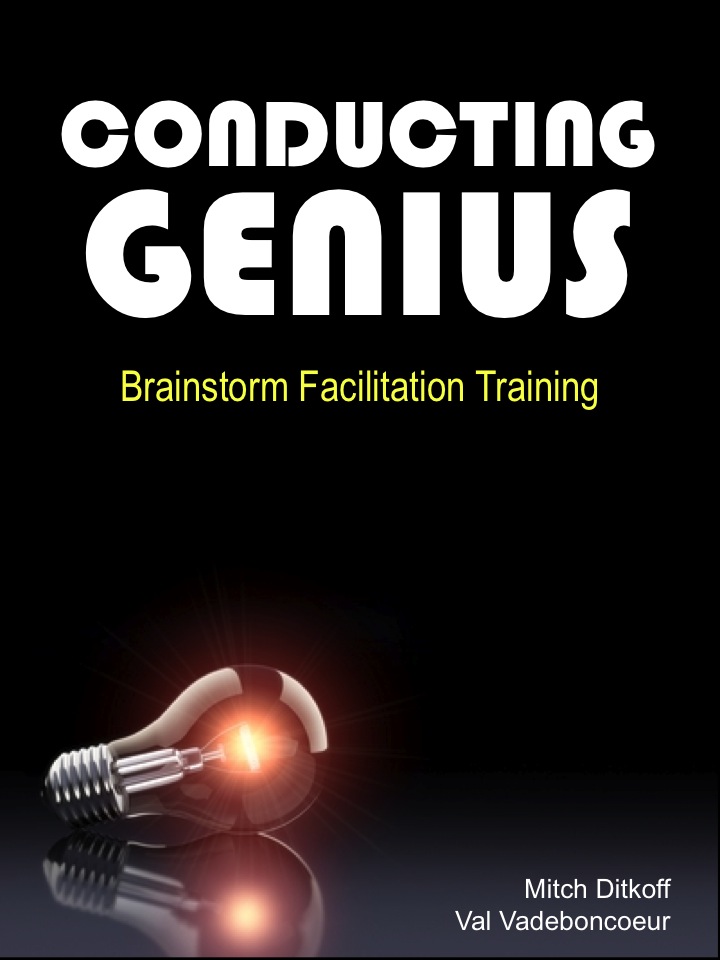Cavemen with Briefcases in Need of a Wise Person's Story

Storytelling at Work: The Workshop
Storytelling to Create the Innovation Mindset
Storytelling at Work: The Book
Storytelling in the Workplace: The Radio Interview
Posted by Mitch Ditkoff at 08:22 PM | Comments (0)
April 18, 2016You CAN Tell a Book by its Cover -- Especially If You Have 9 Choices

Ever hear the phrase "You can't judge a book by it's cover?" Of course you have. But what you probably haven't heard is how far back that phrase goes -- all the way back to June, 1867, as seen in the newspaper, Piqua Democrat. "Don't judge a book by its cover, see a man by his cloth, as there is often a good deal of solid worth and superior skill underneath a jacket and yaller pants."
While no one at Idea Champions, as far I as know, has never thought about buying a pair of "yaller pants", we have thought about designing the cover of our CONDUCTING GENIUS workbook in a way that communicates what exists beyond the cover. Which is why we offer nine different cover designs for the people who participate in our brainstorm facilitation training. Take a peek below and see if YOU can get a feeling for what our 1-3 day course is all about.









This is the training it accompanies
This is what our clients say
Idea Champions
Posted by Mitch Ditkoff at 08:03 PM | Comments (6)
The Curious Origins of the Stop Sign
I've been doing some fascinating research lately on the origins of common objects in our lives -- things we see daily, but often take for granted. Like the Stop Sign, for example.
Most people think the Stop Sign was created to regulate traffic. Not true. According to Dr. Ellison Burke of the Global Institute for Slowing Things Down Before You Hurt Yourself, the origin of the Stop Sign has nothing to do with traffic -- and dates back several thousand years.
Historical references to the Stop Sign have been noted in more than 27 civilizations, most notably Babylonia, Egypt, Mesopotamia, Sumeria, Crete, Rome, and the Han Dynasty.

According to social scientists, each of these civilizations experienced one or more periods of rapid growth now referred to in the literature as "Societal Acceleration Syndrome" -- the way in which daily transactions speed up in proportion to a civilization's escalating Gross National Product.
In other words, speed has become one of the most statistically predicable indicators of a civilization's development and, as I will note later in this article, eventual decline.
My research doesn't end here, however. In each of the above-mentioned civilizations, there have always been a small, but vocal group of citizens who -- concerned about the quickening pace of daily life -- have warned the masses about this dangerous phenomenon.
Indeed, a joint longitudinal study conducted by the Yukon Archeological Institute and the Asian Society for Shorter Haiku, has revealed that this "small, but highly committed group of socially responsible citizens" has made repeated efforts to diffuse their respective society's "escalating addiction to velocity."
In Sumeria, for example, a fringe group of philosophers and poets routinely posted "Styopsian" signs at strategic intersections throughout the country -- not to stop traffic, but to stop unnecessary "mind movement."
Their effort resonated with the citizenry and eventually led to the widespread appearance of what modern day sociologists now refer to as "stop signs" -- in urban centers, villages, cattle crossings, and universities.
One of the most curious facts I've unearthed in my research is this: For the past 2,000 years, Stop Signs, regardless of the country of origin, have always been octagonal.
Apparently, each side of this iconic 8-sided, cross-cultural symbol for stillness, has been imbued with a secret teaching of great import:

1. Slow down
2. Pay attention
3. Look around
4. Pause
5. Look within
6. Breathe deeply
7. Appreciate
8. Move consciously
And so... the next time you see a Stop Sign, you may want to remember that you, no matter where you think you're going or how quickly you need to get there are, in fact, in the act of receiving one of the most timeless of teachings -- one that preceded Facebook, Instagram, Snapchat, texting, and Donald Trump tweeting in the middle of the night.
Next week... the YIELD SIGN.
ED NOTE: It has recently come to my attention that some readers of this blog have questioned my research methods and the veracity of my findings. A quick Google search of "Dr. Ellison Burke" and the "Global Institute for Cross-Cultural Studies," they claim, reveals not a single link. Frankly, I am baffled by their assertions and have assigned five of my brightest research assistants to get to the bottom of the matter. In the meantime, as I put to rest the niggling, naysaying deflections of my detractors, you may want to contemplate the timeless words of modern-day social scientists, Simon and Garfunkel: "Slow down, you're moving too fast, you gotta make the morning last."
This story NOT included in this book
This story NOT included in this website
This story NOT included in this training
Stop Signs 'R Us
Posted by Mitch Ditkoff at 12:12 AM | Comments (5)
April 12, 2016When Dogs Spark Big Ideas

During the past 25 years I have facilitated more than 1,000 brainstorming sessions for a wide variety of heavy hitting organizations -- everyone from MTV to GE to government think thanks. I've worked with left-brained people, right-brained people, and reptilian-brained people.
As you might imagine, I've developed quite a few techniques to get people out of their heads and into a more robust realm of possibility. But the biggest breakthroughs I've seen have had less to do with my methods than they did with spontaneous occurrences.
Like the time a Porcelain Hotel Dog became the catalyst for a game changing product idea.

Here's the deal:
I was leading a daylong ideation session for a large telecommunications company when it was time for lunch. Everyone left the room, visions of tuna wraps in their head, when I noticed a peculiar looking porcelain dog, next to a plastic fern, in the corner of the room -- the kind of kitschy piece of Americana you'd walk by at a yard sale, mumbling under your breath that this was absolutely the last time you'd ever attend a yard sale.
Somehow, I found myself drawn to the dog and, being in a particularly playful mood, picked it up and placed it on a folding chair in the middle of the room.
Tickled by its absolute uselessness and lack of beauty, I put my hat on it's weird, little head, and went about my business of getting ready for the afternoon session.
Five minutes later, the head of HR walks into the room, takes off his power tie, and places it, with a chuckle, around the dog's neck.
Then an IT guy enters, removes his "Hello My Name Is" badge and sticks it on the dog's chest. A well-dressed marketing woman removes her necklace and wraps it around the dog's waist.
There, in the middle of the room, unleashed, unbarking, but no longer unloved, sits the perfect brainstorm session mascot -- a 3D embodiment of our collective mind at that moment in time.

The rest of the participants return soon enough and gather around the porcelain dog as if it was the Holy Grail. A Blackberry gets taped to his back, a scarf gets wrapped around his neck. Someone puts a bandaid over his mouth.
Something is happening that has absolutely nothing to do with my agenda for the day. A curious kind of creativity portal is opening up right before my eyes.
"OK!" I blurt, as soon as the last person returns from lunch. "What cool, new product ideas come to mind when you look at good ole' Fido here?"
Ideas start flooding the room. Big ideas. Bold ideas. Totally ridiculous ideas.
In just a few minutes, it is clear that a big idea is emerging -- an idea for a niche telecommunications market no one in this room has ever considered before -- animals -- more specifically, dogs who live with blind or disabled people -- the kind of dogs who could easily be trained to push a large red button on a one-button phone any time their Master was unable to -- what soon became known to all of us in that room, as the Paw Phone.
Pet idea conceived, we spend the next ten minutes fleshing it out, adding it to the list of the other big ideas to be presented at the end of the day to an independent focus group.
The funny thing? Of the ten ideas we pitched to the focus group that day, the Paw Phone was the third highest rated. Woof woof.
COMMENTARY

Good ideas can come from anyone at any time and any place. While it is impossible to predict precisely when and where the good ideas will manifest, it is possible to predict the conditions that will make it more likely for the good ideas to make their appearance.
In the Paw Phone session, one of these conditions was the spirit of playfulness and spontaneity that manifested itself so gloriously during the lunch break.
At that time, I simply followed my hunch that the porcelain dog, was, somehow, part of the creative process. I didn't know how things would unfold. I could only trust my instincts and past experience that, often, seemingly random catalysts are the DNA for breakthrough. That, and the fact, that when we manage to enter the state of not trying we often get the best results.
Carl Jung understood this phenomenon: "The creation of something new," he said, "is not accomplished by the intellect, but by the play instinct arising from inner necessity. The creative mind plays with the object it loves."
Play! The creative mind plays with the object it loves! Yes!
And yet, in the corporate world, playfulness is often demonized, marginalized, and ignored -- branded "unprofessional" -- as if it was a symptom of the worst kind of anti-business slacker mentality.
Indeed, if you find yourself laughing on the job, many of the people around you will think you aren't taking your job seriously. No wonder 62% of all Americans characterize themselves as being dissatisfied with work.
The roots of this weirdness can be traced all the way back to the Garden of Eden.
What happened to Adam when he took a bite of the forbidden fruit? He was condemned, for life, to earning his living by "the sweat of his brow". The free lunch was over. Adam's spontaneity doomed him to a life of heavy lifting and we are the ones who have gotten the hernia.
It's time to shed the notion that work always has to be so serious -- that grunting and groaning is the preferred response and that laughter, in the workplace, means you're not working. Baloney. Untrue. Bogus. Cro-magnon. Insane.
This just in: Life is supposed to be fun. And since work is a part of life, it too needs to be fun -- especially when you find yourself in the middle of a brainstorming session, trying to originate the kind of ideas that will make a difference in the world.
FOOD FOR THOUGHT:
On a scale of 1-10, with 10 being the highest, how serious is your workplace? The brainstorming sessions you attend?. And if it's 7 or more, what can you do to lighten things up?
BONUS QUESTION: What laughable idea of yours may have more merit in it if you just dig a little deeper into the essence of what that idea is really all about?
Excerpted from Storytelling at Work
Brainstorm facilitation training
What our clients say
Idea Champions
High velocity brainstorming
Posted by Mitch Ditkoff at 10:45 PM | Comments (0)
April 07, 2016Upgrade Your Brainstorm Facilitation Skills the Simple Way
Want to upgrade the quality of your company's brainstorm sessions? Looking for a simple way to open the creative floodgates? Here's one way.
Read this if you think brainstorming is bogus.
Covers for our new 142-page facilitator guidebook
A fun read
Posted by Mitch Ditkoff at 07:37 AM | Comments (0)
April 06, 2016When There's Only 4 Seconds Left
Sometimes, it seems as if the game is over, that time is running out -- but WAIT! It ain't over til it's over! No way! Kris Jenkins drains a long range jumper at the buzzer and Villanova wins the NCAA National Championship! Bedlam ensues! (PS: YOU still have at least four metaphorical seconds left. Go for it! Take the shot! Swish!)
I'm taking my shot
Quotes to help you take YOUR shot
Idea Champions
Posted by Mitch Ditkoff at 04:14 PM | Comments (0)
April 04, 2016What's the Key to Your Success?

Bring your most passionate project to mind -- the ONE THING you are excited about manifesting. Maybe it's just sitting there like a lump. Or maybe you are making progress every day. Whatever it is, take a look at the list below and CHOOSE the one quality you need more of in order to succeed. Once you've decided, consult our online GENIE. He can help. All you need is about 10 minutes. No charge.
1. Vision
2. Focus
3. Courage
4. Collaboration
5. Execution
6. Marketing
7. Funding
8. Fun
9. Creativity
10. Getting buy in
11. Feedback
12. Experimentation
13. Planning
14. Storytelling
15. Letting go
16. Immersion
17. Social media
18. Teamwork
19. Incubation
20. Perseverance
PS: If what you need is not on the list above, it will be on THIS LIST.
Posted by Mitch Ditkoff at 05:35 PM | Comments (0)
The Crowdsourced Birth of a New Book Beyond Business InnovationGreetings! It's me, Mitch Ditkoff, author of this blog, President of Idea Champions, writer, speaker, husband, father, and dust particle. If you've been enjoying this blog, there is a good chance you will enjoy my forthcoming book. Towards that end, I have just launched a GoFundMe campaign and am inviting you to participate. We're talking crowd-sourced funding -- a way for me to buy the time and resources I need to write, produce, publish, and promote the book before hell freezes over. Hope you can be part of it! It takes a village... and a few village idiots!
Click here to find out more
Click here if you don't want to find out more
Posted by Mitch Ditkoff at 02:51 PM | Comments (0)














